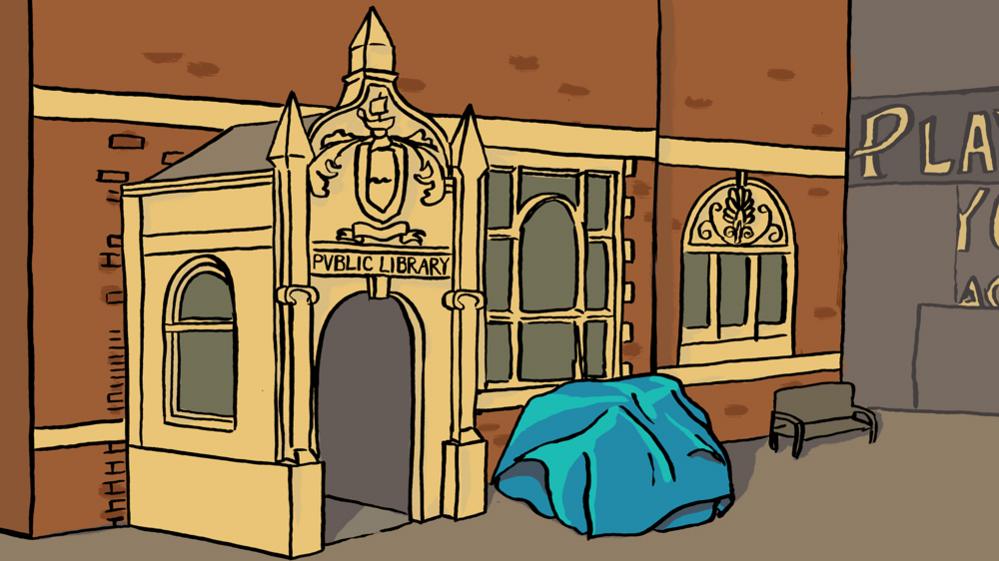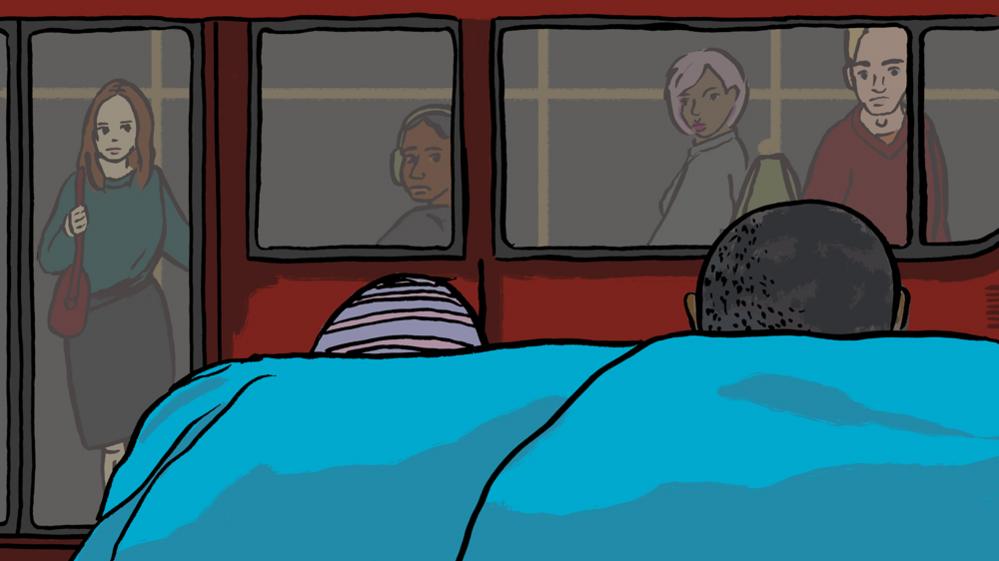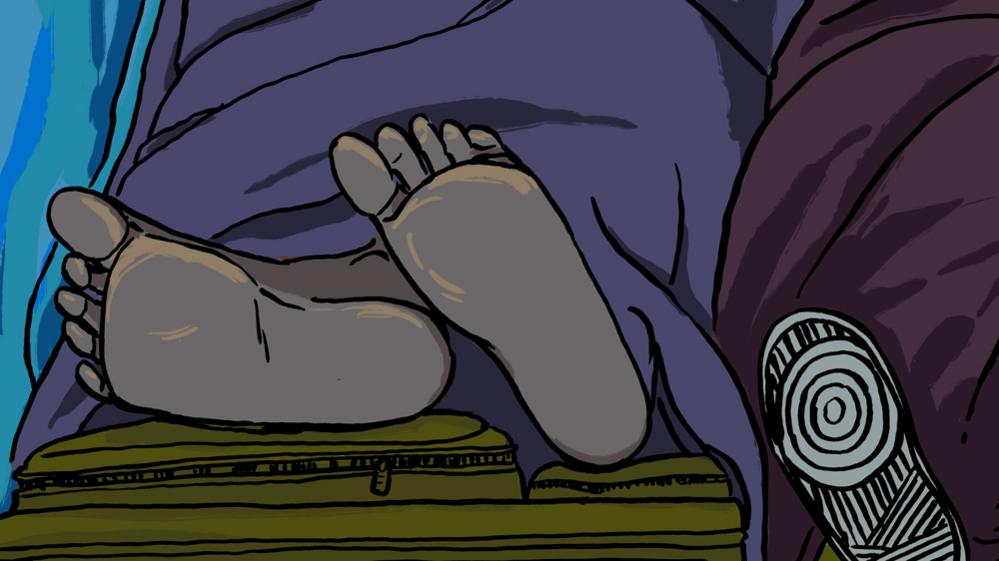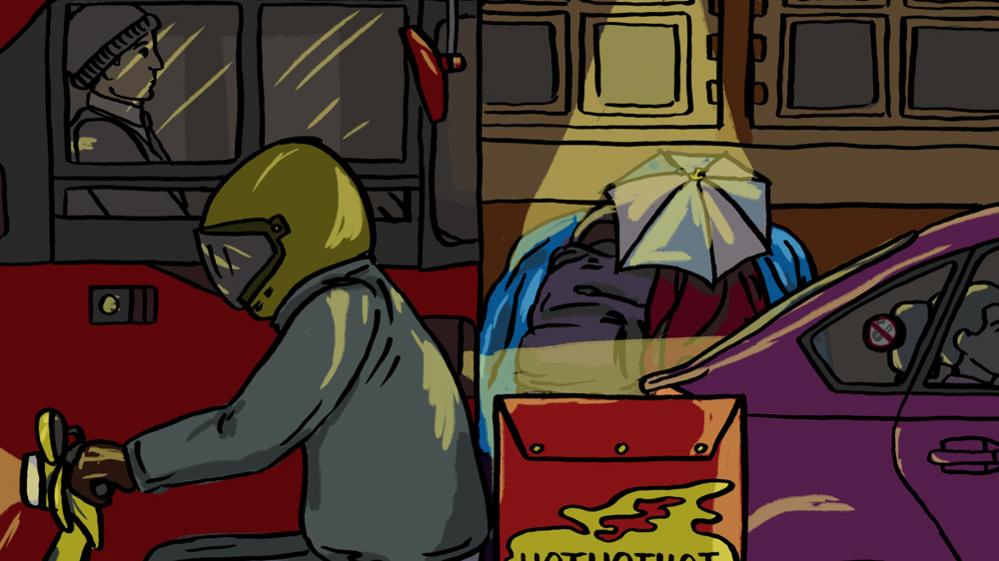Is it OK if someone wants to live for years on a bench?
- Published

In 2017, freelance writer Tom de Castella noticed an elderly woman and her son living on a bench in south London. He discovered they had already been there for two years… which was puzzling. Why hadn't anyone done anything to help them? Why did everyone accept it as normal? The more he investigated, the stranger it seemed.
A large bulky object wrapped in a bright blue tarpaulin. It is sitting in the middle of the pavement. It could be an old piano, maintenance equipment, a delivery waiting to be unpacked. But then the tarpaulin starts to move, an arm appears and the cover is pulled back to reveal a man and a woman, swaddled in blankets sitting on a bench.
They have been living on this bench on a busy London street for more than four years. By day they sit there watching the world go by. At night they pull the cover over and sleep. The bench has become their home.
When I first saw them, I assumed they were another tragic homelessness statistic, abandoned by society. But the more you know the more complicated it becomes.
So who are they?
As I looked into it, I discovered that the bench people are a mother and her adult son, originally from Somalia. The mother is in her 70s, the son in his 30s, although he looks older.
And bizarrely, it turns out that they have been offered a series of flats by the council. Each offer has been refused - they haven't even gone to have a look. Living on the bench appears to be a choice.
A survey for the Greater London Authority and the charity, St Mungo's, found a total of 3,289 people sleeping rough in the capital at least once between October and December last year, the highest figure since records began. But less than a quarter of London's rough-sleepers have been on the street for two consecutive years. Could it be that the mother and son have lived outdoors, in the same very public place, for longer than anyone else in the UK?
I do some checking and the bench people's backstory is this. For a few years they lived in a council flat in Battersea - about three miles north of Tooting. But after the death of a family member rent arrears built up, and in February 2014 Wandsworth Council evicted them.
Sources close to the council say temporary accommodation had been lined up for them that same day, but the mother and son never showed up.
No-one foresaw what would happen next.
The first bench they made their home was outside a TK Maxx store on Upper Tooting Road, a few hundred metres from where they are now. But in December 2014 they were hospitalised because of the cold - and while they were away the council had the bench removed, claiming this was "in their best interests".
When the mother was discharged - her son remained in hospital for a while longer - she headed home to the bench only to find it had gone. A reporter for the Wandsworth Guardian described the scene, external: "The woman is now huddled up on a chair, using an umbrella to shelter her from the rain. She is wrapped up in blankets, alone, on the exact spot where the bench once stood."
There was also, for a time, a bench in Balham.
Then, no later than April 2015, the mother and son moved to a bench outside Tooting library. And there they have stayed.

It's 2.15pm on a weekday afternoon. The mother and son are pulling the tarpaulin over their heads to have a rest. A bus is stuck in traffic beside them as they do this. Everyone on the lower deck turns to watch. You can see the curiosity on people's faces: "Is that a shelter? Do these people really live here?"
There's something incongruous about the blue-tarpaulin structure in among the hipster barbers, bao bun places and nearby market stalls serving locally distilled gin. Tooting is rapidly gentrifying. But here are two people with nothing apart from a few blankets.

From a distance, the mother and son appear lost in Zen-like contemplation of their surroundings.
He occasionally reads a book or brushes his hair. She tends to sit and stare. The practicalities are hard to fathom. How do you fit two sleeping bodies on that bench? Do they sleep sitting up? (They do, with the help of cushions to lean back on, and suitcases to support their feet.)
Are they warm enough in sub-zero conditions and can they stay cool at the height of summer? What about noise? There's the beep, beep, beep of the pelican crossing, the bass roar of buses and the screech of food-delivery mopeds that rarely stop, day or night. I am guessing here, but it seems they are able to zone out. Their demeanour suggests they're watching telly in their living room, not feet away from pedestrians and snarled-up traffic.
They never beg. There is no drink or drugs problem, people who work with them say. They don't accept food or blankets from passers-by but seem to enjoy talking to them. They survive by having a huge pile of blankets and an array of food and drinks beside their feet donated by local restaurants and fast-food outlets. They use the toilets and washing facilities in the library or local cafes. I learn that minicabs give them free lifts. The son goes to the local mosque each day to pray. They have become a fixture on Mitcham Road, supported by the community, a part of Tooting. But what do they say about the experience?
It's the end of January and so cold I can see my breath even though it's almost midday. I'm curious to know how they've been coping.
Me: Hi, are you OK? (They smile back.) I can't believe you're in the cold so much. In the night time, is it OK for you?
Son: It's cold. Sometimes very cold.
Me: How long have you been here for?
Son: Long time. Years and years.
Me: Years and years. Why? I saw something in the paper. The council said they've given you a flat but you didn't want to move.
Son: It's impossible.
Me: Why?
Son: I can't tell you… (A bus roars past and I can't hear his full reply.)
Me: Would you like to live in a house or live on the bench?
Son: We stay here.
Me: You stay here?
Son: Yeah.
Me: Forever?
Son: I don't know.
Me: Really?
Son: We can be lucky. (The rest of his answer gets lost in the noise of the traffic. I'm left wondering exactly what he means.)
Me: But if the council gives you a flat would you move into it?
Son: I can't tell you now, I'm sorry.
At this point the mother starts laughing and the son starts chuckling too. It's contagious, something to do with absurdity - I laugh as well. They can tell I find their situation bizarre and I sense they in turn find my questions bizarre, as if their answers are obvious and I am being obtuse. I tell them I'm writing something about them for the BBC. The son says he knows the BBC. I tell them I worry about them being here in such cold weather.
Me: Most people are inside.
Son: Yes, we not inside a flat.
Me: Would you like to sleep in a bed in a house?
Son: House needs heat and outside it's the same.
Mother: Yes! Same! (The mother is emphatic. This is the clincher, she seems to be saying. Everywhere needs heat, it doesn't matter whether you are inside or out.)
Me: It's difficult when there are no walls and no heating though?
Mother: Yes! Same!
I try to elicit more information about what it's like living on a bench but the son is not keen to say more. "No, I'm very sorry," he says with a smile. I ask if they're from Somalia and he says yes. He says it was a long time ago that they came. We part smiling at each other, on good terms but perplexed by each others' questions and answers.
In the couple of brief chats I'd had before, I'd wondered if their English was good enough to talk. Now I don't believe that basic comprehension is the problem. Instead I worry about their ability to understand their situation and the options available to them. They've told me that living in the open and living in a house are the same in winter. And that everywhere is cold in the winter. What's the difference between a bench and a flat? Who needs a bed? It's hard to argue back. Are they aware that their lifestyle may be bad for their health, I wonder.
An hour later I'm in Al Jazeera Coffee, a cafe in nearby Streatham popular with Somalis. Groups of men in coats and scarves are huddled round tables, warming themselves with glasses of black tea and espresso. I'm directed to Abdiaziz Hashi, a man who knows their story well. He went to see the mother and son, he says, but they wouldn't listen to him.
The Somali community feel hurt by the case. They have repeatedly offered the mother and son lodging in people's homes, but, like the council, each time they have been rebuffed. I am shown a Somali language news report on YouTube interviewing Somalis in Tooting about the case. A woman in an embroidered headscarf says: "I am saddened by it. We have tried everything - she (the mother) refused to listen to our advice." A man in a leather cap says: "It's a massive embarrassment. If the Somali community wants to do something about it, they could solve it."
My companion shakes his head. There is not much more the Somali community can do, he says. He is in awe of their resilience but worried about the effect of their lifestyle on their mental well-being. "If it was me I would have died long ago in that situation. I don't know how they survive."
I ask him what should happen. His answer is emphatic and urgent. "They should be moved in a humanitarian way. These people are definitely sick."
Later that night I'm walking home from the tube. It's 9.50pm and the temperature is 5C, the temperature of a fridge. Their blue tarpaulin is pulled down. It's going to be a low of -3C tonight, according to the BBC forecast. Whereas, even with the heating off all day, my house will be 13 or 14C.

Why would a homeless person refuse accommodation?
It may be because the offer "doesn't fit their needs" says Hannah Gousy, policy manager at the charity, Crisis.
They may prefer sleeping rough to sharing a hostel with others who, like them, could have complex needs arising from trauma, abuse, addiction. They may not trust other homeless people, or the agencies who say they want to help.
Having a place of their own could also be a daunting prospect for those accustomed to life on the street. You have to pay bills and get benefits. You have to obey other people's rules.
The best approach for getting people into accommodation, Gousy argues, is Housing First - currently being piloted in Liverpool, Manchester and the West Midlands. It gives homeless people with the most entrenched problems their own home, backed with "wraparound" support. Maybe Housing First would be able to persuade the mother and son to try moving into a flat, but it's not widely available in London.

I find myself pondering another question. Are the mother and son breaking the law by being there? I ask a range of lawyers what would happen if I were to occupy a bench in this way.
Gary Rycroft, a solicitor put forward by the Law Society, says it's a clear trespass. "Trespass will arise wherever there is a landowner whose land is being occupied by an unauthorised party." But can a bench on a public pavement be seen as somebody's property? "There will always be a landowner. If a bench has been placed on the land then whoever did that must feel they have the right to do it. Land which the public have a right to access may be owned by the local authority or may be part of the public highway."
Shelter disagrees. Their legal adviser says it is "not either a criminal offence or a breach of the civil law (not even a trespass) to move your belongings and family on to a park bench, or indeed to pitch a tent in the high street or outside the Council offices - unless there is a local by-law which makes it unlawful". Wandsworth Council later informs me it has no by-law to prevent people sleeping on a bench. The usual offences used to justify moving rough sleepers on are begging, anti-social behaviour or blocking the public highway. None of these apply here.
However, look hard enough and the authorities always seem to find a way, Shelter says. The Vagrancy Act 1824, which refers to "vagabonds and rogues", prohibits someone from "wandering abroad and lodging in any barn or outhouse, or in any deserted or unoccupied building, or in the open air, or under a tent, or in any cart or wagon, and not giving a good account of himself". And the legal niceties don't always matter: "The police will often just insist on people 'moving on' because they have been asked by the local authority to clear the street, but without quoting any specific piece of legislation. Naturally (and wisely), people usually don't ask under what legal provision the police officer is asking them to move." To do so could be interpreted as a breach of the peace or obstructing a police officer, the Shelter expert says.
Sources close to the council say it would be cruel and futile to move them on. The mother and son would simply find another bench, if necessary in another borough. So Wandsworth Council has followed a course of tolerance and restraint, perhaps learning from its mistake of removing the previous bench. The same people tell me that they have a designated social worker who visits them every two or three weeks. And that local charities are also involved with them. The number of times they have been offered a flat runs into three figures, the sources say.
I began by thinking that something must be done. I instinctively felt that the mother and son needed help. Now I know they don't want to be moved, and that they may not be breaking the law, I find myself turning to another question that can no longer be dodged. Are they capable of making a decision in their best interests?
By law a person lacks mental capacity if they cannot do one of the following four things: understand, remember, communicate or weigh up information.
I talk to two well-placed sources. They say the pair have not been found to have any serious mental health issue. The mother and son see the bench as their home, the sources tell me. They like being part of the community, having social contact, chatting to passers-by and they would not feel safe living in a flat.

Soon afterwards, Wandsworth Council sends me a statement about the mother and son.
"Over the last few years Wandsworth Council has offered them four different properties to move into, all very pleasant and fully refurbished, including the original property where they used to live, but they turned all of them down without viewing them. Currently, a property is being held vacant for them and our social work team continues to liaise regularly with the family to try and persuade them to accept it."
The statement adds that if people refuse offers of help, "that is their decision and choice - we cannot force people to accept our help."
It goes on: "Wandsworth Council is enormously concerned for their welfare and has done everything it can to try and resolve this issue and get them off the streets. We will continue to work alongside health partners and other agencies, including the police and local charities, as well as the local Somali community, in closely monitoring this situation - including the physical and mental well-being of these two people and their capacity to make decisions."
It is stalemate.

Death on the streets
The average age of a rough sleeper at death is 44 years for men and 42 years for women, according to the Office for National Statistics (ONS)
Last year the ONS estimated that 597 homeless people died in 2017 in England Wales - mainly on the street, but also in shelters and hospitals
But fatalities only occasionally catch the headlines, such as when two people died outside Parliament last year

A sign of how long this has been going on is that Sadiq Khan - elected London Mayor in 2016 - was involved in their case in December 2014 when he was still MP for Tooting. Shortly after the bench outside TK Maxx had been removed, the Wandsworth Guardian reported Khan saying, external: "Going forward, my priority is to make sure the family have all of the support they need in the long term, and I will continue to work with the council and the police to help seek a solution sooner rather than later."
Khan declined to comment for this story.
Contrary to his hope that this would be resolved "sooner rather than later" there is no end in sight.
It's arguable that this is upsetting for passers-by and the community as a whole. The way I first became aware of them was when my ex's family came to visit. "That's awful," said her dad - and we all agreed - as we saw them there with their suitcases and blankets, seemingly a pathetic indictment of housing policy in Britain. I felt shocked that I had not noticed them up to that day.
The other day I heard three Americans discussing the case as they walked past. One of them, who appeared to live in the area, said: "It's a protest against the council. They want to get housed and won't move until they do. They're here every day." The other two, apparently visiting, seemed to find it hard to understand that this could go on in bustling, increasingly prosperous Tooting. This misreading of the signs must happen a lot. It creates an impression of an apathetic, uncaring society. Imagine trying to explain it to your child.
"I always see people with different opinions, some people want the bench screwed off and them kicked off it," says Anees Kareem who has worked at a fruit and veg stand across the road from the library for the past few years. "My personal opinion is that they need to be taken into care," he says. "Who would want to live like that? Maybe a day if you really had to but four-and-a-half years?"
I tell him that the well-placed sources say they have no serious mental health problems and ask if he's surprised. He pauses, apparently taken aback. "Very much, very much."

My last conversation with them was back on a spring-like February day. The mother smiled in the sunshine and we talked about how nice the weather was.
I asked if she was happy here. A flicker of annoyance spread across her face. Was I intruding? She said she didn't speak English and we said our goodbyes.
I wanted to solve the mystery of what they want from life, but they remain an enigma.
During the summer heatwave, when the temperature reached the high 30s C, they had replaced the tarpaulin with an umbrella, which they used to shelter from the sun. Now they are under cover again as I pass every morning; there has been heavy rain and they are back in hibernation mode.
They seem content on the bench. Their behaviour isn't anti-social, the authorities accept their presence and whatever reservations some local people have, they are mostly treated with kindness and tolerance. Some might regard it as a very British compromise, but can this really be the best place for them to live? I find that hard to accept.
When the council unscrewed their bench in 2014 it said it was acting in the mother and son's best interests. Now it has concluded that it is in their best interest to leave them as they are. It says it respects their choice, but perhaps it's less a choice than a feeling that moving into a flat would be impossibly difficult? Perhaps both sides, in their own ways, are taking the path of least resistance?
If the mother or her son were to become seriously ill or die the community would surely blame itself for doing nothing. But for now it remains numbed to the strange permanence of their blue plastic shelter.
Illustrations by Hello Emma, external